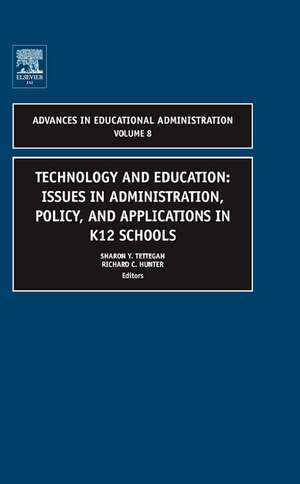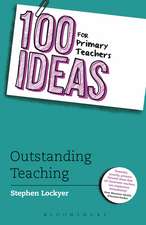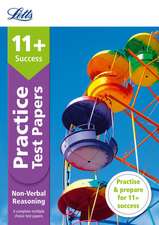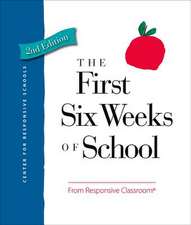Technology and Education – Issues in Administration, Policy and Applications in K12 Schools: Advances in Educational Administration
Autor Sharon Y. Tettegah, Richard C. Hunteren Limba Engleză Hardback – 10 ian 2006
The second part of the book introduces technology, policy and philosophical discussions on the use of technology in schools.
The third section of the book provides an examination of technology of practical applications of technology currently used in schools.
Sharon Tettegah holds faculty appointments in the Department of Curriculum and Instruction and Educational Psychology. She also has appointments with the National Center for Supercomputing Applications and the Beckman Institute at the University of Illinois, Urbana Champaign.
Richard C. Hunter is a faculty member, and former chair in the Department of Educational Organization and Leadership in the College of Education at the University of Illinois, Urbana Champaign.
Din seria Advances in Educational Administration
- 9%
 Preț: 688.44 lei
Preț: 688.44 lei -
 Preț: 565.70 lei
Preț: 565.70 lei - 9%
 Preț: 744.27 lei
Preț: 744.27 lei - 9%
 Preț: 690.19 lei
Preț: 690.19 lei - 23%
 Preț: 944.16 lei
Preț: 944.16 lei - 23%
 Preț: 837.71 lei
Preț: 837.71 lei - 23%
 Preț: 941.81 lei
Preț: 941.81 lei - 23%
 Preț: 970.49 lei
Preț: 970.49 lei - 19%
 Preț: 507.12 lei
Preț: 507.12 lei - 23%
 Preț: 996.23 lei
Preț: 996.23 lei - 23%
 Preț: 965.62 lei
Preț: 965.62 lei - 23%
 Preț: 992.62 lei
Preț: 992.62 lei - 23%
 Preț: 924.42 lei
Preț: 924.42 lei - 23%
 Preț: 1000.74 lei
Preț: 1000.74 lei - 23%
 Preț: 991.86 lei
Preț: 991.86 lei - 14%
 Preț: 1001.85 lei
Preț: 1001.85 lei - 23%
 Preț: 917.04 lei
Preț: 917.04 lei - 23%
 Preț: 864.47 lei
Preț: 864.47 lei - 23%
 Preț: 846.71 lei
Preț: 846.71 lei
Preț: 833.32 lei
Preț vechi: 1082.24 lei
-23% Nou
Puncte Express: 1250
Preț estimativ în valută:
159.46€ • 166.91$ • 132.72£
159.46€ • 166.91$ • 132.72£
Carte tipărită la comandă
Livrare economică 31 martie-14 aprilie
Preluare comenzi: 021 569.72.76
Specificații
ISBN-13: 9780762312801
ISBN-10: 0762312807
Pagini: 336
Dimensiuni: 155 x 234 x 483 mm
Greutate: 0.6 kg
Editura: Emerald Publishing
Seria Advances in Educational Administration
ISBN-10: 0762312807
Pagini: 336
Dimensiuni: 155 x 234 x 483 mm
Greutate: 0.6 kg
Editura: Emerald Publishing
Seria Advances in Educational Administration
Public țintă
Educators, education researchers and studentsCuprins
Part I: Technology, Schools, and Administration: Raising Awareness.
Changing Schools with Technology: What Every School Should Know about Innovation. (D.M. Marcovitz). Cyber-Bullying and Schools in an Electronic Era. (S.Y. Tettegah, D. Betout, K. Taylor). Critical Support Framework for K-12 School and University Technology Partnerships. (L.C. Yamagata-Lynch, S. Smaldino).
The Pasteurization of Education. (D. Williamson Shaffer, K.D. Squire). Teacher as Brand: Pursuing Professional Identities in a Digital Domain. (J.B. Keller, M.J. Stuve).
Part II: Technology, Policy, and Philosophy: What all School Districts Should Know. Copyright, Technology, and Your Rights. (D.M. Marcovitz). Beyond the Digital Divide. (N.C. Burbules, T.A., Callister, Jr. C. Taaffe). Technology and Urban Youth: Emergent Issues Regarding Access. (D.G. Williams, T.L. Carr, N.S. Clifton).
Acceptable Use Policies in School Districts: Myth or Reality? (K.R. Taylor, Eun Won Whang, S. Tettegah). Knowing and Getting What You Pay For: Administration, Technology, and Accountability in K-12 Schools. (S. Donahoo, M. Whitney).
A Hermeneutic Approach towards Integrating Technology into Schools: Policy and Practice. (M.Y. Eryaman). Part III. Technology, Applications, and Practice: Actions and Strategies. Educational Digital Libraries: Platforms for Innovation and Equity. (M.A. Mardis, E.S. Hoffman). Integrating Squeak into a community: A Collaborative Effort. (B. Hug, G. Reese). Collaborative Learning Environments - Developing SMART Classrooms in Theory and in Practice. (B. Carter, T. Linder). Can We Talk? Communication Technologies, Social Informatics, and Systemic Change. (B. Monroe). Ubiquitous Computing: Rethinking Teaching, Learning and Technology Integration. (Karen Swan et al.). Digital Photo Journals: A Novel Approach to Addressing Early Childhood Technology Standards and Recommendations. (C. Carter Ching, X.C. Wang, Y. Kedem). Personal, Professional, Technical, and Institutional Factors Involved In Developing a Computer-Intensive English Curriculum. (J.A. Federmeier, R.T. Clift). Superintendent Leadership for Technology Integration in Public Education. (R.C. Hunter).
Changing Schools with Technology: What Every School Should Know about Innovation. (D.M. Marcovitz). Cyber-Bullying and Schools in an Electronic Era. (S.Y. Tettegah, D. Betout, K. Taylor). Critical Support Framework for K-12 School and University Technology Partnerships. (L.C. Yamagata-Lynch, S. Smaldino).
The Pasteurization of Education. (D. Williamson Shaffer, K.D. Squire). Teacher as Brand: Pursuing Professional Identities in a Digital Domain. (J.B. Keller, M.J. Stuve).
Part II: Technology, Policy, and Philosophy: What all School Districts Should Know. Copyright, Technology, and Your Rights. (D.M. Marcovitz). Beyond the Digital Divide. (N.C. Burbules, T.A., Callister, Jr. C. Taaffe). Technology and Urban Youth: Emergent Issues Regarding Access. (D.G. Williams, T.L. Carr, N.S. Clifton).
Acceptable Use Policies in School Districts: Myth or Reality? (K.R. Taylor, Eun Won Whang, S. Tettegah). Knowing and Getting What You Pay For: Administration, Technology, and Accountability in K-12 Schools. (S. Donahoo, M. Whitney).
A Hermeneutic Approach towards Integrating Technology into Schools: Policy and Practice. (M.Y. Eryaman). Part III. Technology, Applications, and Practice: Actions and Strategies. Educational Digital Libraries: Platforms for Innovation and Equity. (M.A. Mardis, E.S. Hoffman). Integrating Squeak into a community: A Collaborative Effort. (B. Hug, G. Reese). Collaborative Learning Environments - Developing SMART Classrooms in Theory and in Practice. (B. Carter, T. Linder). Can We Talk? Communication Technologies, Social Informatics, and Systemic Change. (B. Monroe). Ubiquitous Computing: Rethinking Teaching, Learning and Technology Integration. (Karen Swan et al.). Digital Photo Journals: A Novel Approach to Addressing Early Childhood Technology Standards and Recommendations. (C. Carter Ching, X.C. Wang, Y. Kedem). Personal, Professional, Technical, and Institutional Factors Involved In Developing a Computer-Intensive English Curriculum. (J.A. Federmeier, R.T. Clift). Superintendent Leadership for Technology Integration in Public Education. (R.C. Hunter).











